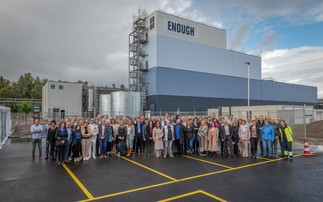Unilever's Paul Polman warns deforestation is struggling to secure the status it deserves at climate talks
Later this year, global leaders will make important decisions about some of the planet's toughest challenges. If the world wants a climate deal and new development agenda that's good for the economy, for the poor, and for businesses, the path forward needs to include forests.
In September, governments will set goals for eliminating extreme poverty by 2030, having first agreed on ways to mobilise the investments needed to succeed. Then, this December in Paris, nations will agree a potentially far-reaching climate change pact. This pact will stitch together various country-level action plans through 2025 or 2030. In parallel, companies will also announce new climate goals. These pledges will show that both the public and private sectors are doing more than ever before.
Yet, collectively these pledges will fall short of what the world needs to keep global warming to less than 2C, a threshold that scientists and governments have agreed is critical to avoid catastrophic consequences for hundreds of millions of people. To strengthen the Paris agreement global leaders should look to the world's forests.
At the UN Secretary-General's Climate Summit in September 2014, over 175 countries, companies and organisations representing indigenous peoples, signed the New York Declaration on Forests - committing to cutting global natural forest loss in half by 2020, and ending it entirely by 2030, while also increasing forest restoration.
A critical mass of tropical forest nations and global agricultural companies strongly endorsed these ambitious goals for the first time. And advanced economies committed to providing large-scale economic incentives to help make dramatic progress possible. Once implemented, according to the UN, achieving these goals will cut between 4.5 and 8.8 billion tons of carbon pollution per year by 2030 - about the same as ending all climate pollution from every car in the world. And doing so is more cost-effective than other climate solutions, with many benefits for the 1.6 billion people who depend on forests for their livelihoods.
Several developing countries are leading the way. Brazil has reduced forest loss in the Amazon by more than 75 percent, all while increasing agricultural productivity and rural incomes for the poor. These results came about through strengthening policies and implementing better governance, with leadership from within government, as well as the private sector and civil society.
Late last year Peru committed to end deforestation by 2021, in partnership with Norway and Germany. Colombia recently unveiled plans for one of the largest protected areas in the world, committing to restore one million hectares of forested area and to reach net zero deforestation in the Amazon region by 2020. Last year, 14 of the world's leading forest countries, including Colombia and Peru, pledged to come forward with ambitious forest goals before Paris and challenged industrialised economies to deliver on their 2014 commitment to create real economic incentives for action.
The private sector is also leading. In 2010, the Consumer Goods Forum brought together companies with over $3tr in annual revenues, pledging to eliminate deforestation from their supply chains by 2020. Consumer companies like Unilever, Nestlé, McDonalds and major agricultural commodity traders like Wilmar, Cargill and Archer Daniels Midland, have committed to implement that pledge.
Over the past 18 months alone the share of global trade in palm oil covered by corporate zero deforestation commitments has grown from five per cent to around 90 per cent. Since agriculture accounts for over 70 per cent of tropical deforestation, these commitments have the potential for enormous impact - but this of course depends on them being fully implemented, and companies across the supply chain must play their part. Doing so is good for business because it secures our license to operate, future-proofs our supply and mitigates risk in a world of finite resources. It means doing the right thing by the planet and being able to serve consumers in decades to come.
But forest countries, local communities and companies cannot succeed alone. Now developed countries must fulfill their commitment to create economic incentives for action. Forest nations willing to do more than their fair share to solve the climate crisis should be rewarded through results-based payments. In Paris, developed nations should make good on their 2014 pledges to provide economic incentives by committing to financing two billion tons of emission reductions per year from tropical forests by 2020. The 2015 New Climate Economy report from the Global Commission on Economy and Climate, of which I am a Commissioner, also argues for scaled up international flows for REDD+ beyond 2020, with the aim of financing a further one billion tons of emissions reductions per year from 2020 and beyond.
These funds should finance place-based partnerships to increase agricultural output and rural incomes by intensifying agricultural production and restoring productivity to environmentally degraded lands - rather than by expanding agriculture at the expense of forests, forest-dependent communities and the climate.
China and India, both significant importers of forest-risk commodities, should also start to wield their buying power. They can send an important signal that the biggest and fastest-growing markets for palm, soy and other commodities want and expect them to be sustainably sourced.
Through these investments and signals the world can feed its growing population, end extreme poverty, protect forests and tackle climate change in the most efficient and equitable way possible.
So far forest partnerships are not featuring prominently in climate discussions heading into Paris. The talks are focusing on what each country can do by itself, instead of also looking at what more we can do by working together. This is a miscalculation. It ignores pro-growth, low-cost opportunities for action, and exacerbates the risk that many developing countries will not have enough at stake for an ambitious deal on climate. Fortunately, there's still time to turn this around. The world can and should take the forest path to an ambitious climate deal.
Paul Polman is chairman of the World Business Council for Sustainable Development and chief executive of Unilever. You can follow him on Twitter @PaulPolman.








